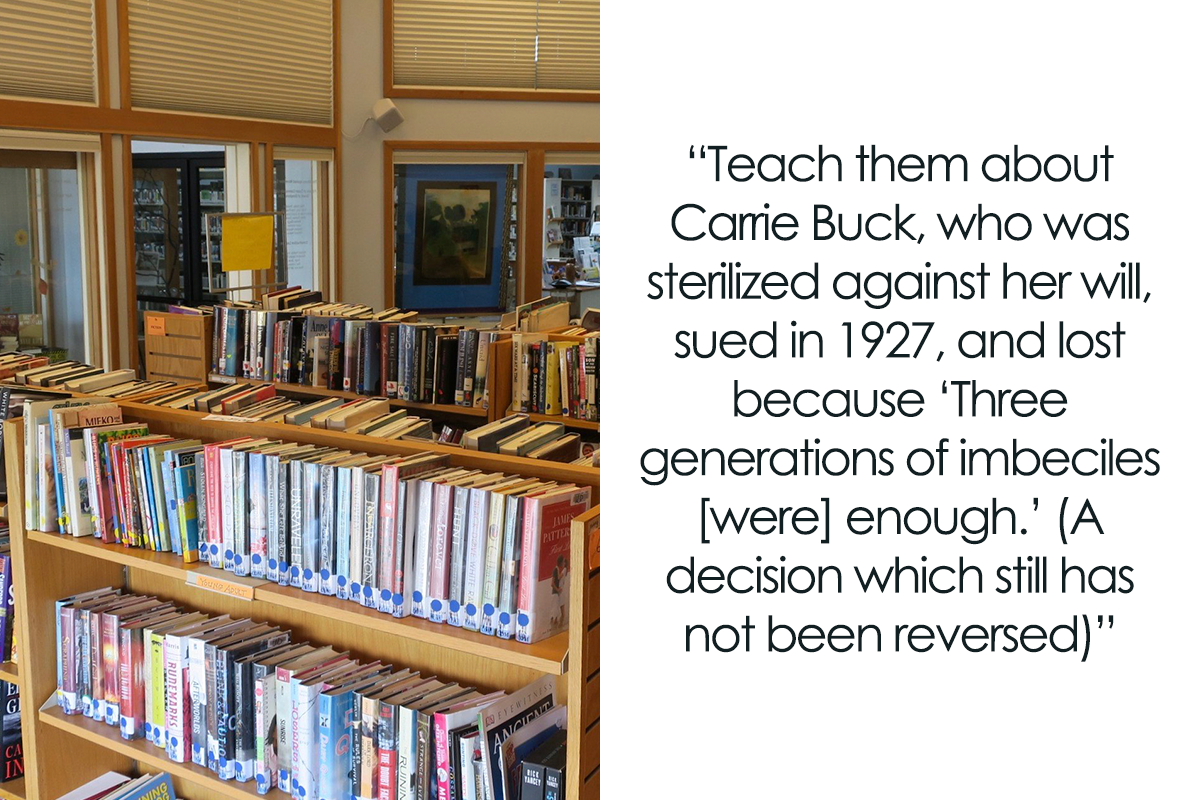
People Online Are Discussing Disability History After A Tumblr User Shares 6 Events That Are Not Talked About Enough From It
Usually at school, history lessons try to cover the most important things that happened in known history and typically, we learn about our own country’s past in a little bit more detail. It is impossible to learn about everything, not only because there is not enough time physically, but the curriculum often gets criticized for omitting certain topics that people consider to be significant.
Tumblr user prettyasapic proposes that every person should be taught disability history as people with disabilities were often mistreated, their human rights were violated and their merits were forgotten because their minds or bodies worked differently.
More info: Тumblr
A person on Tumblr was concerned that not a lot of people are aware of the intense disability history, so they decided to enlighten others about it
Image credits: Gaël Marziou
The Tumblr user suggests that people should be taught more about how disabled people were actually treated and what great things they achieved despite having more difficult circumstances than an able-bodied person has.
They gave a few examples. First of all, they mentioned Carrie Buck, who was deemed to be “feeble-minded” even though she was an average student. It is a term used to describe people who had intellectual disabilities and had a pejorative connotation.
But because people considered her to be defective, the Supreme Court forcefully sterilized her under Virginia’s Sterilization Act of 1924 in order to stop people diagnosed with “insanity … idiocy, imbecility, feeble-mindedness or epilepsy” from having kids who would also possibly could have the same condition. Carrie was only one in about 60,000 people whom the Court deemed to be unsuitable for reproduction.
Image credits: prettyasapic
They talked about some important people and events that lead to decisions being made in favor of disabled people on a governmental scale
Image credits: prettyasapic
Another person the Tumblr user wishes more people knew about is Judith Heumann, who was a disability rights activist who organized a protest in 1977. She and her associates in the disability community occupied federal buildings in Atlanta, Boston, Chicago, Denver, Los Angeles, New York City, Philadelphia, and Seattle for 28 hours demanding the enforcement of the legislation of Section 504 of the Rehabilitation Act, which was the most important disability rights legislation in the US passed in 1973.
Image credits: prettyasapic
They tried to humanize people with disabilities and show how much they have had to go through to come to the partial tolerance they are treated with now
Image credits: prettyasapic
Image credits: Timothy Krause
Prettyasapic urges us not to forget all the Baby Does that died in the 1980s only because they were disabled and the parents didn’t think they were worth giving treatment. Because of these cases, the US government issued Baby Doe regulations in 1984 that required hospitals to contact courts or child protective agencies if parents refused to treat infants with congenital defects.
A year later, a new law known as the Baby Doe Amendment came into effect, which forbade parents from withholding food and fluids from disabled newborns as well as necessary treatment.
Other people felt the same level of passion towards this topic and shared even more information about this part of history
Image credits: only-book-lovers-left-alive
Image credits: archwrites
They mention I. King Jordan, who was the first Deaf Gallaudet University President after protesting yet another hearing president in this liberal art school meant for people with hearing disabilities.
The Tumblr user also quoted Jim Sinclair, an autism-rights movement activist, who felt people treated him differently and believed they didn’t have life, proving the contrary and waiting for society to see that so they could be equal members.
They mentioned some people they admire and shared some resources people can go to in order to better understand people with disabilities
Image credits: Andrea
Image credits: circusfreak-tylee
They need more understanding because they still face rough conditions as they often live below the poverty line
Image credits: circusfreak-tylee
People in the comments shared other examples of people fighting for disability rights who they admired and the cruel behavior they had to go through just because they were different from others.
These things are important to understand and know in order to not repeat the same mistakes now. Sadly, disabled people don’t think this world accommodates them enough, even after all those decades of effort.
Image credits: circusfreak-tylee
Image credits: cre8iveovadose
People with disabilities have a high risk of developing depression and anxiety because they are often left to deal with their problems alone
Image credits: cre8iveovadose
Disabilities might require big funds to manage, so a lot of people who are physically or mentally impaired live in poverty. It doesn’t help that disability discrimination is very real and some conditions actually prevent people from performing their jobs.
People with disabilities may find it difficult to live alone, but at the same time they are quite isolated and are more likely to experience emotional stress, develop depression and anxiety.
Image credits: cre8iveovadose
But people bringing up this topic, getting inspiration from the past, and learning from its mistakes leads to the change we are all waiting for
Image credits: cre8iveovadose
Common Wealth Fund’s survey shows that there are changes that must happen for people with disabilities to live with more independence and dignity. They suggest “Adequate funding for LTSS, including community-based services” would make a difference and “Many issues that are currently treated in clinical settings could be taken care of in the community.”
Another thing that could be done is to provide support to those people who live with someone with disabilities. They also suggest creating support programs together with the people who will use them, instead of only asking for feedback afterwards, or not asking anything at all.
Have you ever heard any of these stories mentioned by Tumblr users? Do you think it is an important part of history that doesn’t get enough recognition? Also, what do you think can be improved in the support system for people with disabilities, or do you feel their rights are already equal? We are curious to know your thoughts, so leave them in the comments!
This is an interesting read but I want more knowledge! Also, I realised that I use disability slurs without thinking about it (jokingly calling a friend with a broken leg, a cripple) and how I need to be more aware of what I'm saying
That’s great! Learning more benefits youself and your whole community, as disability rights are central to all human rights. There are many disability advocates and educators you might be interested in looking up. Judy Heumann or Imani Barbarin (both Americans) are the first two I thought of, but there are many others. The most important part is to make sure that you’re learning about disability history and current activism from disabled people or disabled-led groups. As much as people mean well, those who are non-disabled (including those who work with disabled people or have disabled family members) can often get things wrong. The disabled community is vocal and all of the info you need can be found from them directly.
Load More Replies...I am disabled and live in subsidized housing. I worked from 1973 until 2001, and have a pension that I cannot receive. If I do, my rent would increase by $400 a month. I would also lose other benefits. It isn't worth it.
My left foot was required reading in my English class, and part of the exam. We analysed the movie, book and writer. It should be mandatory part of curriculum.
Also maybe more appealing for teenagers would be a book by Benjamin Lebert, Crazy. This was introduced to us in fifth grade, might be now cancelled due to language or parents who are afraid of sex education, but highly recommend reading it especially if you have teenagers that might not be too tolerating against disabilities
Load More Replies...This is an interesting read but I want more knowledge! Also, I realised that I use disability slurs without thinking about it (jokingly calling a friend with a broken leg, a cripple) and how I need to be more aware of what I'm saying
That’s great! Learning more benefits youself and your whole community, as disability rights are central to all human rights. There are many disability advocates and educators you might be interested in looking up. Judy Heumann or Imani Barbarin (both Americans) are the first two I thought of, but there are many others. The most important part is to make sure that you’re learning about disability history and current activism from disabled people or disabled-led groups. As much as people mean well, those who are non-disabled (including those who work with disabled people or have disabled family members) can often get things wrong. The disabled community is vocal and all of the info you need can be found from them directly.
Load More Replies...I am disabled and live in subsidized housing. I worked from 1973 until 2001, and have a pension that I cannot receive. If I do, my rent would increase by $400 a month. I would also lose other benefits. It isn't worth it.
My left foot was required reading in my English class, and part of the exam. We analysed the movie, book and writer. It should be mandatory part of curriculum.
Also maybe more appealing for teenagers would be a book by Benjamin Lebert, Crazy. This was introduced to us in fifth grade, might be now cancelled due to language or parents who are afraid of sex education, but highly recommend reading it especially if you have teenagers that might not be too tolerating against disabilities
Load More Replies...
 Dark Mode
Dark Mode 

 No fees, cancel anytime
No fees, cancel anytime 





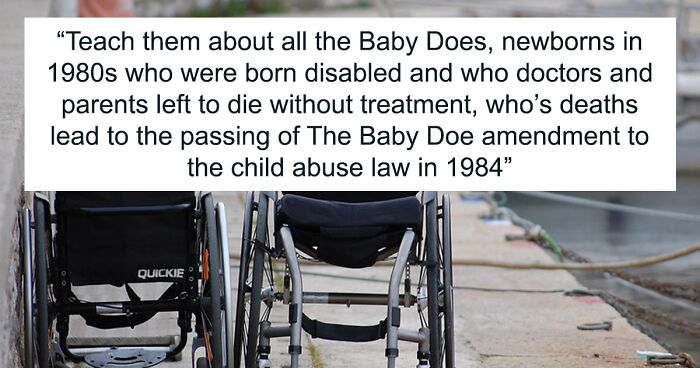







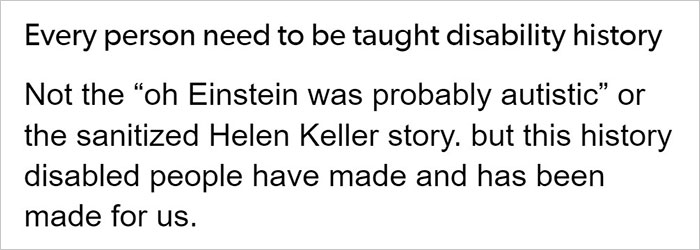


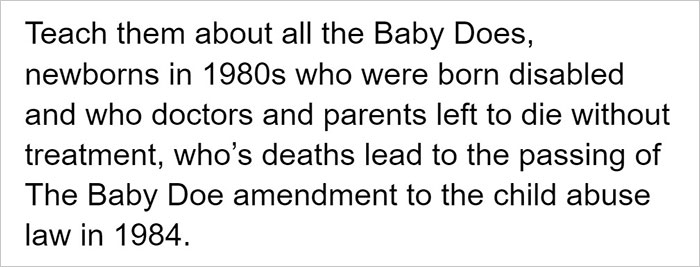
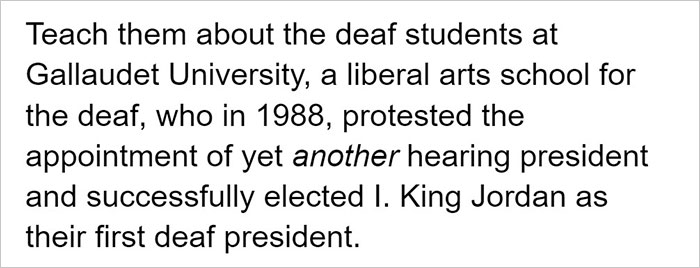

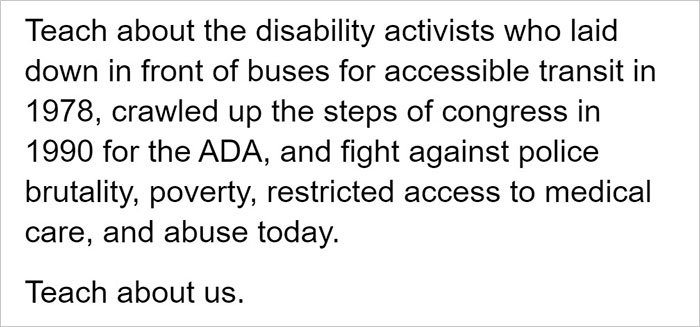
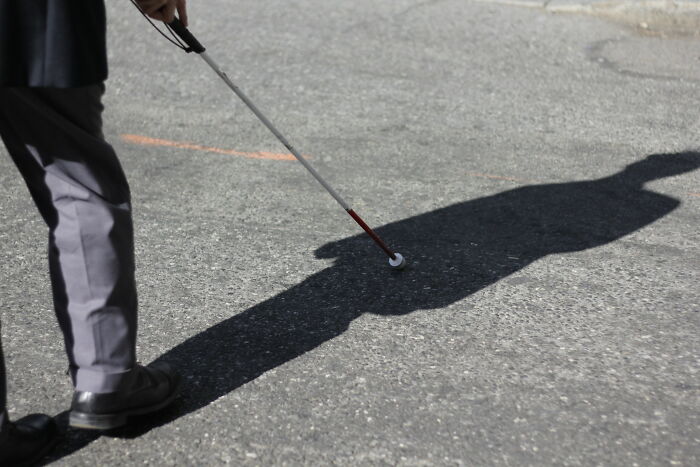
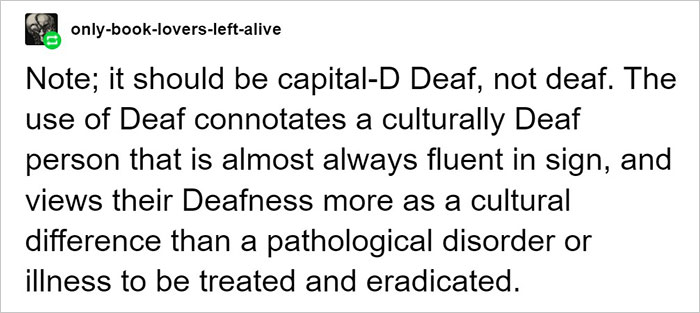
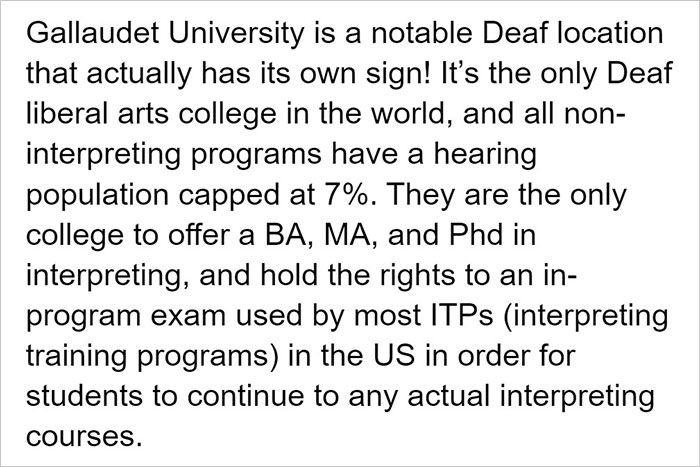
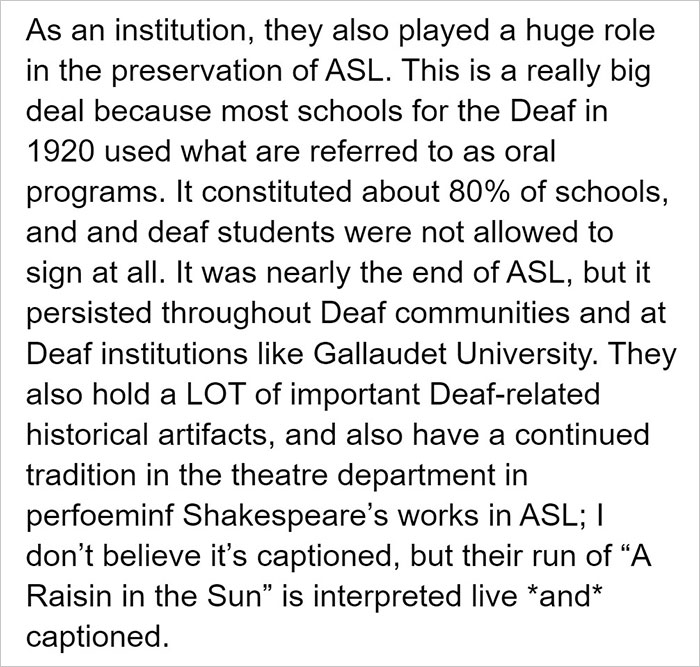
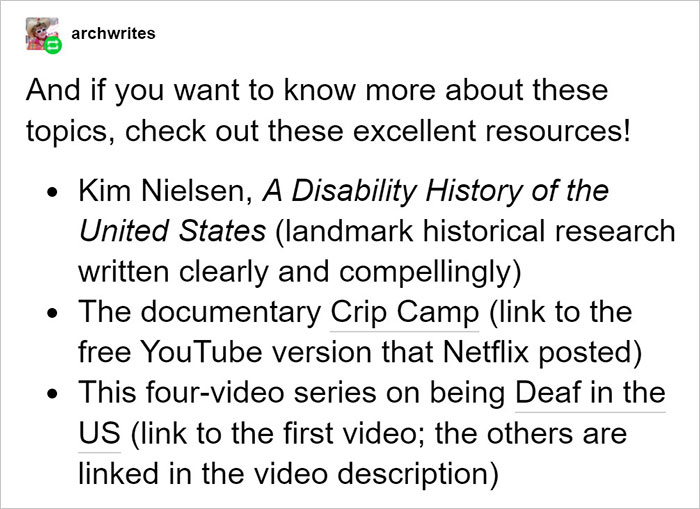
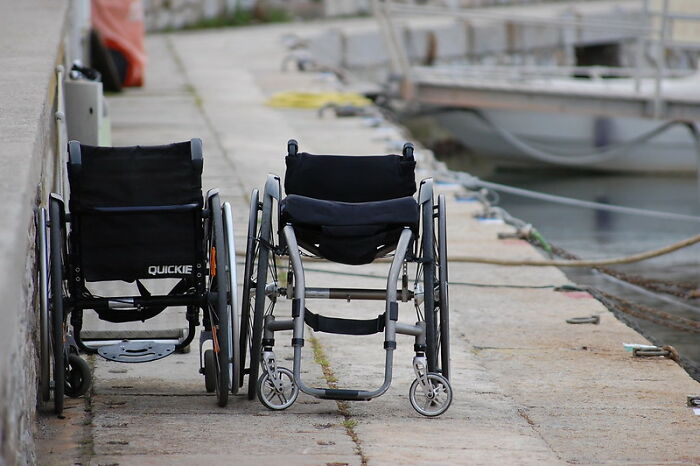
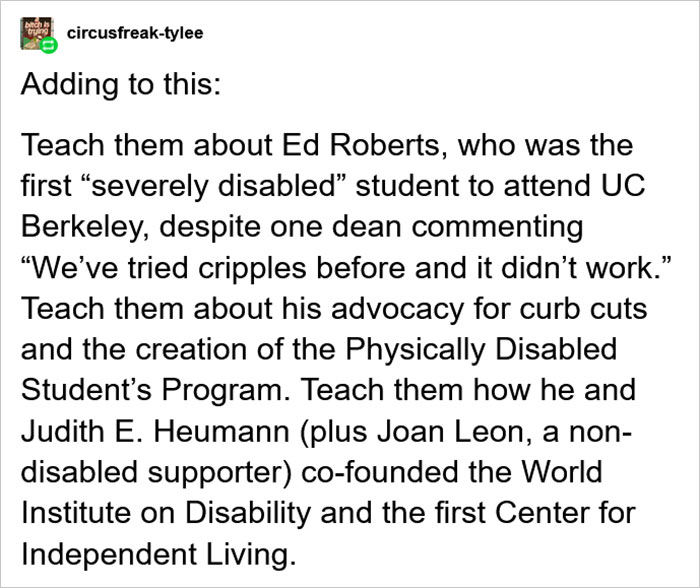

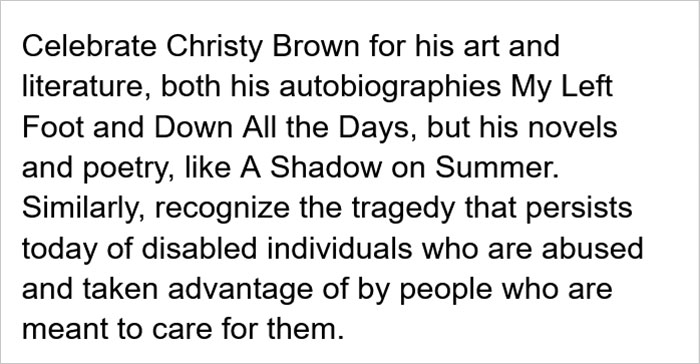
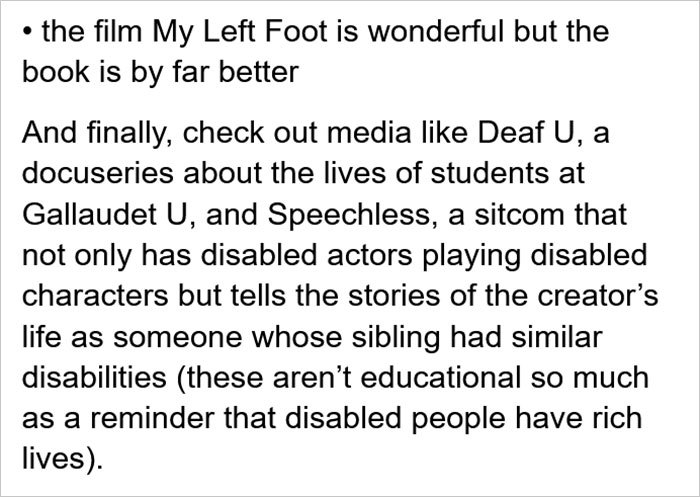
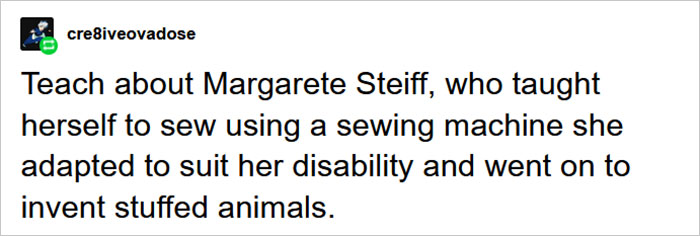

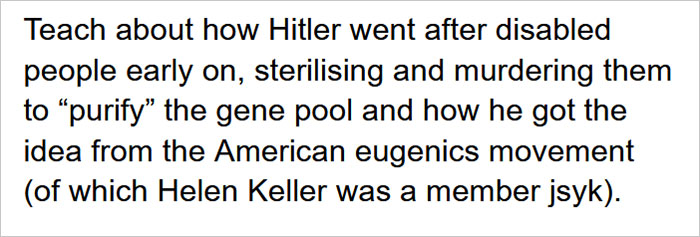
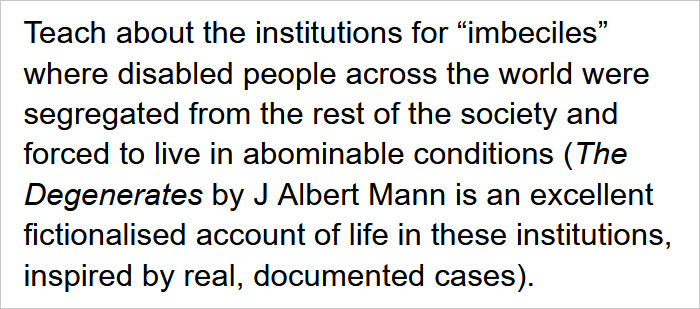

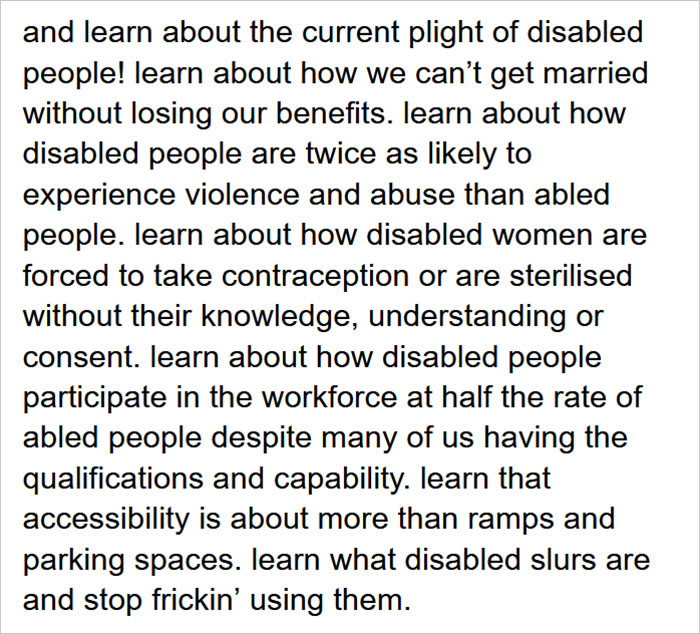
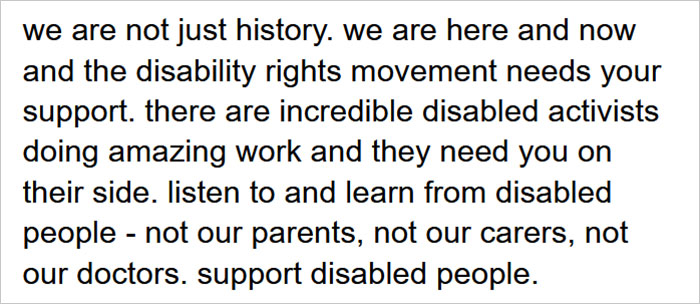











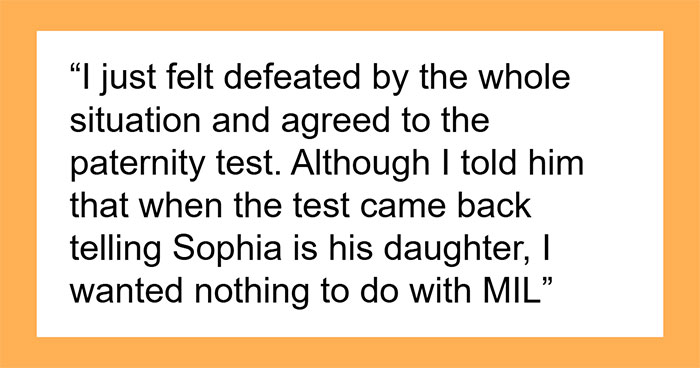




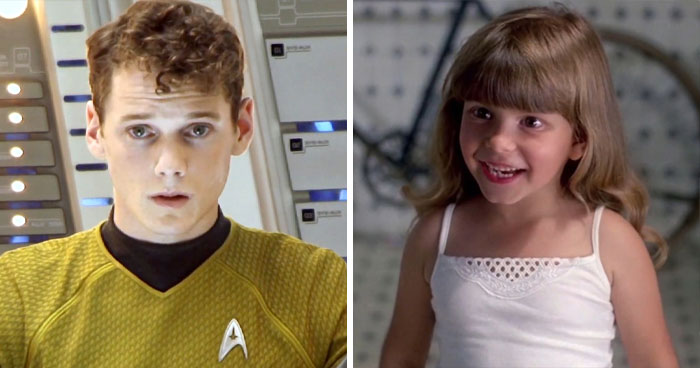




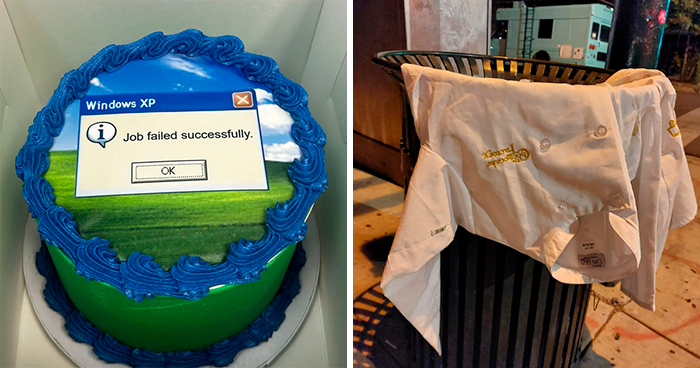
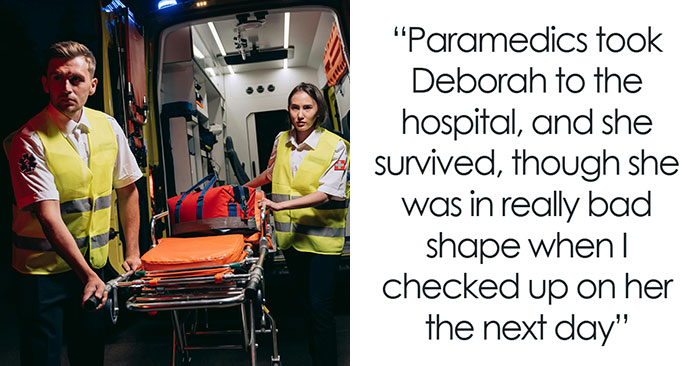
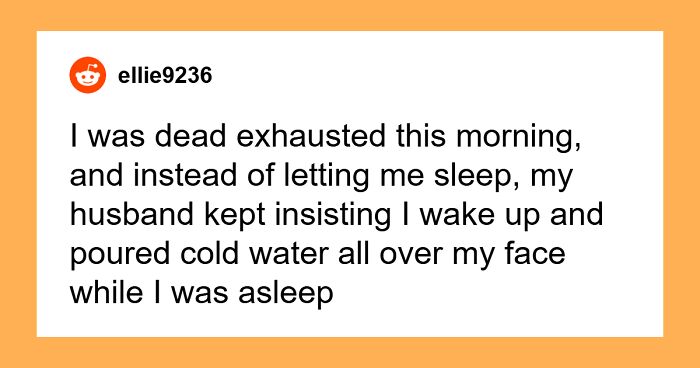
147
45